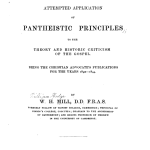Making a (short) book-length contribution to the question of Christology and monotheism in early Christianity, Dunn’s new book (Did the First Christians Worship Jesus?) brings an important critical voice to the conversation that has largely been dominated in the last decade or so by Larry Hurtado and Richard Bauckham. The way into this discussion is through the (seemingly) simple question: Did the first Christians worship Jesus? Dunn points out that most Christians ASSUME the answer is YES. He thinks otherwise, based on the New Testament evidence.
In his discussion of terms for worship in the NT, he finds few clear instances where Jesus is worshipped as a god. Almost exclusively, when the terminology of worship is used, it is for the one God (see p. 17). Dunn also looks at worship practices and comes to similar conclusions (see p. 57). So, what do we do with Jesus and his “special” status vis-a-vis the first Christians?
In the third chapter, Dunn looks at spiritual mediators in early Judaism (angels, exalted humans, personified Wisdom, etc…) and argues that such agents bring “the divine presence into humans’ daily reality–not simply a message from Yahweh, but the real presence of Yahweh” (p. 90). While I like part of what Dunn is saying here, he seems to treat all people/items in this category the same, which is not logically necessary or apparent to me.
In chapter 4, when it comes to Jesus, Dunn argues that he was understood “to embody the outreach of God himself” (p. 146). Dunn focuses on Jesus’ work as agent – one who is not worshipped personally or individually. However, Dunn acknowledges that Jesus is so often in the picture of early Christian worship because he is the means of worship of the true God. For Dunn, there is a clear distinction to be made. Dunn warns against “Jesus-olatry” – treating Jesus as a “god” separate from God the Father, an independent divine being worthy of worship. Instead Dunn prefers the idea of Jesus as an icon – a “window through which the eye passes, through which the beyond can be seen, through which divine reality can be witnessed” (147).
I think Dunn has offered some very important points of caution and clarification – it is not the normal habit of the early Christians, as seen in the NT, to “worship” Jesus as a god. He is included in Christian worship, but not as one to be worshipped in the same way as God the Father is worshipped. Practically speaking, there does seem to be a higher place given to God the Father in worship, according to Dunn.
I had some concerns with the shape of Dunn’s discussion, though. Firstly, while I appreciate his concerns and cautions, I think he comes out as arguing for Jesus as the best in category – the most effective divine mediator in history. While I think Dunn is correct that Jesus was viewed as a special agent, the evidence seems to me to place him in a unique category – one that does not fit a previously-devised “slot.” For example, Gordon Fee has pointed out enough times when Paul uses the term LORD ambiguously (Lord Yahweh or Lord Jesus?) that this would have caused some blurring of lines for the early Christians, I think. Perhaps the same confusion we have today (Do I pray to Jesus or “God”?) may have been experienced early on as well.
A second problem I have with Dunn’s discussion is his ostensible minimization of those texts that seem to connect Jesus directly to divine honors and terms: e.g., John 20:28. In such texts, Dunn seems to want to argue that Jesus is only called “God” insofar as he brings God’s presence into the midst of the people. OK, Maybe. Maybe not. It is no more a stretch to think that the disciples “realized” Jesus was a “god” than it is to think that when they say “My Lord and my God” they really mean “My Lord and my God are mysteriously present in a special way in Jesus, though Jesus himself is not a god to be worshipped in his own right.”
Thirdly, Dunn works through various parts of the NT looking for signs of Jesus being worshipped (as a god), and he finds bits here and there and finds nothing or very little where he would be expecting to find it to make a solid case. For example, he notes that there are very few clear instances of worship of Jesus in the Gospels. However, I think he is mistaken to treat all parts of the NT the same. The Gospels focus more on the mystery of Jesus’ advent and life, with a climax in his death and resurrection. These texts are not, properly speaking, liturgical texts. When we do have liturgical texts, the worship of Jesus is more lucid – as in Revelation 5. Of course Jesus is not ubiquitously worshipped as a god in the Gospels – part of the story is the unfolding of his unique role in history and the revelation of his victory in the cross and resurrection. When we get glimpses of his divine glory, they are (only) glimpses probably for narrative/plot reasons, I would think.
Finally, when Dunn gathers all of his evidence, I think the accumulation of insights and thoughts could go either way on the titular question: Did the first Christian worship Jesus? Dunn takes a more minimalistic/negative approach in the end, but I think it could easily be taken the other way. Dunn says, “No, he wasn’t worshipped, but he was a necessary part of worship, the only path through which worship of God could truly take place, and thus he was instrumental in early Christian worship [Nijay’s paraphrasing].” I think it could be taken the other way, “Yes, Jesus was so important to worship it could be called “worship” because of his centrality, uniqueness, and amazing victory of sin and death for the sake of humanity.” Again, the special category that Jesus is in could (and I think does) warrant divine honor.
For example, in Acts 14:11, the Lycaonians think Paul is a god and they shout, “The gods have come down to us in the likeness of men.” Did they think these people were gods or were men-who-mediate-the-unique-presence-of-a-god-but-who-technically-are-not-categorized-as-gods? It is quite obvious that they were going to worship them as gods, even though they were in human form. What category do you think the early Christians would have put Jesus in (i.e. lesser-to-greater principle)?
In the end, I still highly admire Dunn’s book for three reasons. 1.) It helps us think through the terms of divine identity (Bauckham) and binitarian (Hurtado) and their utility, 2.) Dunn offers useful criticisms while maintaining a respectful and irenic tone, and 3.) Dunn is trying to work directly with the NT evidence. As for me, he continues to be a model of good scholarship, even when I disagree. While I enjoyed reading and learned from each and every chapter, I think his final conclusion goes further than his more cautious conclusions at the end of each chapter. Nevertheless, this should be required reading in NT Christology courses!











